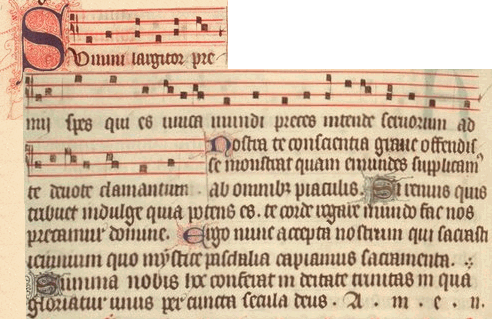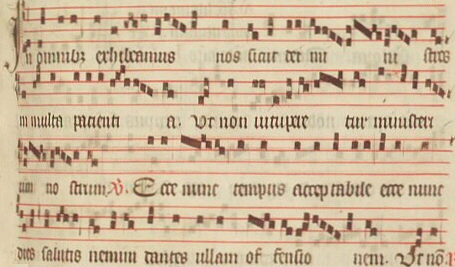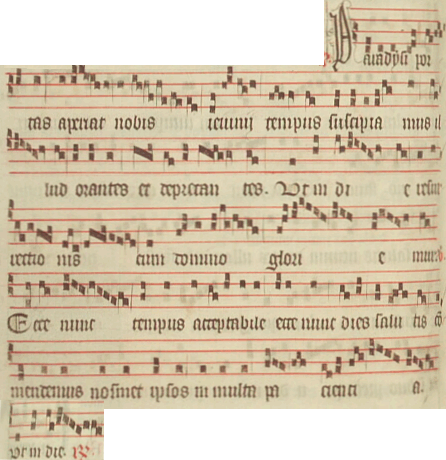READINGS: LENT TUESDAY IV
ἰδοὺ νῦν καιρὸς
εὐπρόσδεκτος, — ἰδοὺ νῦν ἡμέρα σωτηρίας Even Years: Leviticus 19:1-18,31-37
וַיְדַבֵּר
יְהוָה
אֶל־מֹשֶׁה
לֵּאמֹר׃ דַּבֵּר
אֶל־כָּל־עֲדַת
בְּנֵי־יִשְׂרָאֵל
וְאָמַרְתָּ
אֲלֵהֶם
קְדֹשִׁים
תִּהְיוּ
כִּי קָדוֹשׁ
אֲנִי יְהוָה
אֱלֹהֵיכֶם׃
אִישׁ
אִמּוֹ
וְאָבִיו
תִּירָאוּ
וְאֶת־שַׁבְּתֹתַי
תִּשְׁמֹרוּ
אֲנִי יְהוָה
אֱלֹהֵיכֶם׃
אַל־תִּפְנוּ
אֶל־הָאֱלִילִים
וֵאלֹהֵי מַסֵּכָה
לֹא תַעֲשׂוּ
לָכֶם אֲנִי
יְהוָה אֱלֹהֵיכֶם׃
וְכִי
תִזְבְּחוּ
זֶבַח
שְׁלָמִים
לַיהוָה
לִרְצֹנְכֶם
תִּזְבָּחֻהוּ׃ בְּיוֹם
זִבְחֲכֶם
יֵאָכֵל
וּמִמָּחֳרָת
וְהַנּוֹתָר
עַד־יוֹם
הַשְּׁלִישִׁי
בָּאֵשׁ
יִשָּׂרֵף׃ וְאִם
הֵאָכֹל
יֵאָכֵל
בַּיּוֹם
הַשְּׁלִישִׁי
פִּגּוּל
הוּא לֹא
יֵרָצֶה׃ וְאֹכְלָיו
עֲוֹנוֹ
יִשָּׂא
כִּי־אֶת־קֹדֶשׁ
יְהוָה
חִלֵּל
וְנִכְרְתָה
הַנֶּפֶשׁ
הַהִוא
מֵעַמֶּיהָ׃
וּבְקֻצְרְכֶם
אֶת־קְצִיר
אַרְצְכֶם
לֹא תְכַלֶּה
פְּאַת
שָׂדְךָ
לִקְצֹר
וְלֶקֶט קְצִירְךָ
לֹא
תְלַקֵּט׃ וְכַרְמְךָ
לֹא תְעוֹלֵל
וּפֶרֶט
כַּרְמְךָ
לֹא תְלַקֵּט
לֶעָנִי
וְלַגֵּר
תַּעֲזֹב
אֹתָם אֲנִי
יְהוָה
אֱלֹהֵיכֶם׃
לֹא
תִּגְנֹבוּ
וְלֹא־תְכַחֲשׁוּ
וְלֹא־תְשַׁקְּרוּ
אִישׁ
בַּעֲמִיתוֹ׃ וְלֹא־תִשָּׁבְעוּ
בִשְׁמִי
לַשָּׁקֶר
וְחִלַּלְתָּ
אֶת־שֵׁם
אֱלֹהֶיךָ
אֲנִי יְהוָה׃
לֹא־תַעֲשֹׁק
אֶת־רֵעֲךָ
וְלֹא
תִגְזֹל לֹא־תָלִין
פְּעֻלַּת
שָׂכִיר
אִתְּךָ עַד־בֹּקֶר׃ לֹא־תְקַלֵּל
חֵרֵשׁ
וְלִפְנֵי
עִוֵּר לֹא
תִתֵּן
מִכְשֹׁל
וְיָרֵאתָ
מֵּאֱלֹהֶיךָ
אֲנִי
יְהוָה׃
לֹא־תַעֲשׂוּ
עָוֶל
בַּמִּשְׁפָּט
לֹא־תִשָּׂא
פְנֵי־דָל
וְלֹא
תֶהְדַּר
פְּנֵי גָדוֹל
בְּצֶדֶק
תִּשְׁפֹּט
עֲמִיתֶךָ׃ לֹא־תֵלֵךְ
רָכִיל
בְּעַמֶּיךָ
לֹא תַעֲמֹד
עַל־דַּם
רֵעֶךָ אֲנִי
יְהוָה׃
לֹא־תִשְׂנָא
אֶת־אָחִיךָ
בִּלְבָבֶךָ
הוֹכֵחַ
תּוֹכִיחַ
אֶת־עֲמִיתֶךָ
וְלֹא־תִשָּׂא
עָלָיו
חֵטְא׃ לֹא־תִקֹּם
וְלֹא־תִטֹּר
אֶת־בְּנֵי
עַמֶּךָ
וְאָהַבְתָּ
לְרֵעֲךָ
כָּמוֹךָ
אֲנִי
יְהוָה׃
אַל־תִּפְנוּ
אֶל־הָאֹבֹת
וְאֶל־הַיִּדְּעֹנִים
אַל־תְּבַקְשׁוּ
לְטָמְאָה
בָהֶם אֲנִי
יְהוָה
אֱלֹהֵיכֶם׃
מִפְּנֵי
שֵׂיבָה
תָּקוּם
וְהָדַרְתָּ
פְּנֵי זָקֵן
וְיָרֵאתָ
מֵּאֱלֹהֶיךָ
אֲנִי
יְהוָה׃
וְכִי־יָגוּר
אִתְּךָ גֵּר
בְּאַרְצְכֶם
לֹא תוֹנוּ
אֹתוֹ׃ כְּאֶזְרָח
מִכֶּם
יִהְיֶה
לָכֶם הַגֵּר
הַגָּר
אִתְּכֶם
וְאָהַבְתָּ
לוֹ כָּמוֹךָ כִּי־גֵרִים
הֱיִיתֶם
בְּאֶרֶץ
מִצְרָיִם
אֲנִי יְהוָה
אֱלֹהֵיכֶם׃
לֹא־תַעֲשׂוּ
עָוֶל
בַּמִּשְׁפָּט
בַּמִּדָּה
בַּמִּשְׁקָל
וּבַמְּשׂוּרָה׃ מֹאזְנֵי
צֶדֶק
אַבְנֵי־צֶדֶק
אֵיפַת צֶדֶק
וְהִין צֶדֶק
יִהְיֶה
לָכֶם אֲנִי
יְהוָה
אֱלֹהֵיכֶם
אֲשֶׁר־הוֹצֵאתִי
אֶתְכֶם מֵאֶרֶץ
מִצְרָיִם׃
וּשְׁמַרְתֶּם
אֶת־כָּל־חֻקֹּתַי
וְאֶת־כָּל־מִשְׁפָּטַי
וַעֲשִׂיתֶם
אֹתָם אֲנִי
יְהוָה׃
3 Each of you will respect father and mother. And you will keep my Sabbaths; I am Yahweh your God.
4 Do not turn to idols and do not cast metal gods for yourselves. I am Yahweh your God.
5 If you offer a communion sacrifice to Yahweh, make it in such a way as to be acceptable. 6 It must be eaten the same day or the day after; whatever is left on the third day must be burnt. 7 If eaten on the third day it would be rotten food and not be acceptable. 8 Anyone who eats it must bear the consequences of this guilt, having profaned Yahweh's holiness; that person will be outlawed from his people.
9 When you reap the harvest of your land, you will not reap to the very edges of the field, nor will you gather the gleanings of the harvest; 10 nor will you strip your vineyard bare, nor pick up the fallen grapes. You will leave them for the poor and the stranger. I am Yahweh your God.
11 You will not steal, nor deal deceitfully or fraudulently with your fellow-citizen. 12 You will not swear by my name with intent to deceive and thus profane the name of your God. I am Yahweh.
13 You will not exploit or rob your fellow. You will not keep back the labourer's wage until next morning. 14 You will not curse the dumb or put an obstacle in the way of the blind, but will fear your God. I am Yahweh.
15 You will not be unjust in administering justice. You will neither be partial to the poor nor overawed by the great, but will administer justice to your fellow-citizen justly. 16 You will not go about slandering your own family, nor will you put your neighbour's life in jeopardy. I am Yahweh.
17 You will not harbour hatred for your brother. You will reprove your fellow-countryman firmly and thus avoid burdening yourself with a sin. 18 You will not exact vengeance on, or bear any sort of grudge against, the members of your race, but will love your neighbour as yourself. I am Yahweh.
31 Do not have recourse to the spirits of the dead or to magicians; they will defile you. I, Yahweh, am your God.
32 You will stand up in the presence of grey hair, you will honour the person of the aged and fear your God. I am Yahweh.
33 If you have resident aliens in your country, you will not molest them. 34 You will treat resident aliens as though they were native-born and love them as yourself—for you yourselves were once aliens in Egypt. I am Yahweh your God.
35 You will not be unjust in administering justice as regards measures of length, weight or capacity. 36 You will have just scales, just weights, a just ephah and a just hin. I am Yahweh your God who brought you out of Egypt; 37 hence you are to keep all my laws and all my customs and put them into practice. I am Yahweh.
Odd Years: Hebrews 8:1-13
κεφάλαιον
δὲ ἐπὶ τοῖς
λεγομένοις,
Even Years: Leo the Great, Sermon 10 for Lent, 3-5 (PL 54, 299-301)
In Ioannis evangelio Dominus dicit: In hoc cognoscent omnes quia mei discipuli estis, si dilectionem habueritis ad invicem; et in eiusdem Apostoli Epistola legitur: Carissimi, diligamus invicem, quoniam caritas ex Deo est, et omnis qui diligit, ex Deo natus est et cognoscit Deum: et qui non diligit, non novit Deum, quoniam Deus caritas est.
Discutiant ergo se fidelium mentes, et intimos sui cordis affectus vera examinatione diudicent; ac si repositum aliquid in conscientiis suis de fructibus caritatis invenerint, Deum sibi inesse non dubitent, et ut magis magisque tanti hospitis sint capaces, fiant perseverantis misericordiae operibus ampliores.
Si enim dilectio Deus est, nullum habere debet terminum caritas, quia nullo potest claudi fine Divinitas.
Ad exercendum igitur, dilectissimi, caritatis bonum, quamvis tempus omne sit congruum, praesentes tamen dies specialius cohortantur: ut, qui Pascha Domini cupiunt cum animi et corporis sanctificatione suscipere, hanc maxime gratiam conentur acquirere, qua et omnium continetur summa virtutum et multitudo tegitur peccatorum.
Ed ideo celebraturi illud eminens super omnia sacramentum, quo iniquitates nostras Iesu Christi sanguis abolevit, misericordiae primitus hostias praeparemus; ut, quod nobis bonitas Dei contulit, nos quoque eis qui in nos peccavere praestemus.
In pauperes quoque et diversis debilitatibus impeditos benignior nunc largitas exseratur, ut gratiae Deo multorum voce referantur, et ieiuniis nostris egentium refectio suffragetur. Nulla enim devotione fidelium magis Dominus delectatur, quam ista quae pauperibus eius empenditur, et ubi curam misericordiae invenit, ibi imaginem suae pietatis agnoscit.
Non timeatur in iis expensis defectio facultatum, quoniam ipsa benignitas magna substantia est, nec potest largitatis deesse materies, ubi Christus pascit et pascitur. In omni hoc opere illa intervenit manus, quae panem frangendo auget, et erogando multiplicat.
Securus et hilaris sit eleemosynae distributor, quia tunc maximum lucrum habebit, quando sibi minimum reservaverit, dicente beato apostolo Paulo: Qui autem administrat semen seminanti, et panem ad manducandum praestabit, et multiplicabit semen vestrum, et augebit incrementa frugum iustitiae vestrae, in Christo Iesu Domino nostro, qui vivit et regnat cum Patre et Spiritu Sancto in saecula saeculorum. Amen.
Odd Years: Leo the Great, Sermon 60, on the Passion, 1-2 (CCL 138A, 363-365)

Invitatory Psalm & BACK

PSALMS and BACK
1 Yahweh spoke to Moses and said: 2 'Speak to the whole community of Israelites and say: "Be holy, for I, Yahweh your God, am holy.
τοιοῦτον
ἔχομεν
ἀρχιερέα,
ὃς
ἐκάθισεν ἐν
δεξιᾷ τοῦ
θρόνου τῆς
μεγαλωσύνης
ἐν τοῖς
οὐρανοῖς,
τῶν
ἁγίων λειτουργὸς
καὶ τῆς σκηνῆς
τῆς ἀληθινῆς,
ἣν
ἔπηξεν ὁ
κύριος, οὐκ
ἄνθρωπος.
πᾶς
γὰρ ἀρχιερεὺς
εἰς τὸ
προσφέρειν
δῶρά τε καὶ θυσίας
καθίσταται:
ὅθεν
ἀναγκαῖον
ἔχειν τι καὶ
τοῦτον ὃ
προσενέγκῃ.
εἰ
μὲν οὖν ἦν ἐπὶ
γῆς, οὐδ' ἂν ἦν
ἱερεύς,
ὄντων
τῶν προσφερόντων
κατὰ νόμον τὰ
δῶρα:
οἵτινες
ὑποδείγματι
καὶ σκιᾷ
λατρεύουσιν
τῶν ἐπουρανίων,
καθὼς
κεχρημάτισται
Μωϋσῆς μέλλων
ἐπιτελεῖν τὴν
σκηνήν,
ὅρα
γάρ, φησίν,
ποιήσεις
πάντα κατὰ τὸν
τύπον τὸν δειχθέντα
σοι ἐν τῷ ὄρει:
νυνὶ
δὲ
διαφορωτέρας
τέτυχεν
λειτουργίας,
ὅσῳ
καὶ
κρείττονός
ἐστιν
διαθήκης
μεσίτης,
ἥτις
ἐπὶ
κρείττοσιν
ἐπαγγελίαις
νενομοθέτηται.
εἰ γὰρ
ἡ πρώτη ἐκείνη
ἦν ἄμεμπτος,
οὐκ
ἂν δευτέρας
ἐζητεῖτο
τόπος:
μεμφόμενος
γὰρ αὐτοὺς
λέγει,
ἰδοὺ
ἡμέραι
ἔρχονται,
λέγει κύριος,
καὶ
συντελέσω ἐπὶ
τὸν οἶκον Ἰσραὴλ
καὶ ἐπὶ τὸν
οἶκον Ἰούδα
διαθήκην
καινήν,
οὐ
κατὰ τὴν
διαθήκην ἣν
ἐποίησα τοῖς
πατράσιν
αὐτῶν
ἐν
ἡμέρᾳ ἐπιλαβομένου
μου τῆς χειρὸς
αὐτῶν
ἐξαγαγεῖν
αὐτοὺς ἐκ γῆς Αἰγύπτου,
ὅτι
αὐτοὶ οὐκ
ἐνέμειναν ἐν
τῇ διαθήκῃ μου,
κἀγὼ
ἠμέλησα αὐτῶν,
λέγει κύριος.
ὅτι
αὕτη ἡ διαθήκη
ἣν διαθήσομαι
τῷ οἴκῳ Ἰσραὴλ
μετὰ
τὰς ἡμέρας
ἐκείνας, λέγει
κύριος,
διδοὺς
νόμους μου εἰς
τὴν διάνοιαν
αὐτῶν,
καὶ
ἐπὶ καρδίας
αὐτῶν
ἐπιγράψω
αὐτούς,
καὶ
ἔσομαι αὐτοῖς
εἰς θεὸν καὶ
αὐτοὶ ἔσονταί
μοι εἰς λαόν.
καὶ
οὐ μὴ
διδάξωσιν
ἕκαστος τὸν πολίτην
αὐτοῦ
καὶ
ἕκαστος τὸν
ἀδελφὸν αὐτοῦ,
λέγων, γνῶθι
τὸν κύριον,
ὅτι
πάντες
εἰδήσουσίν με
ἀπὸ μικροῦ ἕως
μεγάλου αὐτῶν.
ὅτι
ἵλεως ἔσομαι
ταῖς ἀδικίαις
αὐτῶν,
καὶ
τῶν ἁμαρτιῶν
αὐτῶν οὐ μὴ μνησθῶ
ἔτι.
ἐν τῷ
λέγειν καινὴν
πεπαλαίωκεν
τὴν πρώτην:
τὸ δὲ
παλαιούμενον
καὶ γηράσκον
ἐγγὺς
ἀφανισμοῦ.
Hebrews 8:1-13 1 The principal point of all that we have said is that we have a high priest of exactly this kind. He has taken his seat at the right of the throne of divine Majesty in the heavens, 2 and he is the minister of the sanctuary and of the true Tent which the Lord, and not any man, set up. 3 Every high priest is constituted to offer gifts and sacrifices, and so this one too must have something to offer. 4 In fact, if he were on earth, he would not be a priest at all, since there are others who make the offerings laid down by the Law, 5 though these maintain the service only of a model or a reflection of the heavenly realities; just as Moses, when he had the Tent to build, was warned by God who said: See that you work to the design that was shown you on the mountain. 6 As it is, he has been given a ministry as far superior as is the covenant of which he is the mediator, which is founded on better promises. 7 If that first covenant had been faultless, there would have been no room for a second one to replace it. 8 And in fact God does find fault with them; he says: Look, the days are coming, the Lord declares, when I will make a new covenant with the House of Israel and the House of Judah, 9 but not a covenant like the one I made with their ancestors, the day I took them by the hand to bring them out of Egypt, which covenant of mine they broke, and I too abandoned them, the Lord declares. 10 No, this is the covenant I will make with the House of Israel, when those days have come, the Lord declares: In their minds I shall plant my laws writing them on their hearts. Then I shall be their God, and they shall be my people. 11 There will be no further need for each to teach his neighbour, and each his brother, saying 'Learn to know the Lord!' No, they will all know me, from the least to the greatest, 12 since I shall forgive their guilt and never more call their sins to mind. 13 By speaking of a new covenant, he implies that the first one is old. And anything old and ageing is ready to disappear.
Sacramentum, dilectissimi, Dominicae passionis in salutem humani generis ante tempora aeterna dispositum, et per multas significationes omnibus retro saeculis nuntiatum, non adhuc exspectamus manifestandum, sed jam adoramus impletum. Concurrentibus igitur ad eruditionem nostram et novis testimoniis et antiquis, dum quod prophetica cecinit tuba, evangelica pandit historia, et sicut scriptum est: Abyssus abyssum invocat, in voce cataractarum tuarum; quoniam ad enarrandam gloriam gratiae Dei paribus sibi vocibus, utriusque Testamenti altitudo respondet; et quod erat sub velamine figurarum profundum, fit revelata luce perspicuum. Si tamen inter illa miracula Salvatoris, quae sub populorum gerebantur aspectu, pauci Veritatis praesentiam sentiebant, ipsique discipuli voluntaria Domini passione turbati, non evaserunt scandalum crucis sine tentatione formidinis; unde fides nostra intelligentiam sumeret, unde conscientia robur acciperet, nisi quae facta cognoscimus, praedicta legeremus?
The mystery of the Lord's Passion was ordained before the beginning of time for the salvation of the human race and foretold by many signs in every era of the past. No longer do we look forward to something yet to be made manifest; we bow in adoration before what has already been fulfilled. Both the Old and New Testaments agree for our instruction, and the Gospel story unfolds for us what the prophet's trumpet had sounded. As Scripture says: Deep calls to deep in the roar of your torrents, since from the depths of each Testament voice answers voice, telling the same story of the glory of God's grace. What was formerly hidden behind a veil of symbols is now clear in the light of Revelation.
Despite the miracles of performed by our Saviour for all to see, few recognized the presence of Truth himself. If his disciples themselves were troubled by the Passion he voluntarily undertook, and if they yielded to the temptation of fear when faced with the scandal of the Cross, where can our faith find understanding, our minds find strength, except in the fact that all those events we know to have been accomplished were foretold in the Scriptures?...
Nunc autem postquam per
susceptionem infirmitatis potentia est clarificata virtutis, nulla fidelium
moestitudine paschalis est obscuranda solemnitas; nec cum tristitia nobis
gestorum ordo recolendus est, cum ita Dominus usus sit malitia Judaeorum, ut de
intentione facinoris, voluntas sit impleta miserentis.
Now that his power and strength have been made manifest in the assumption of human weakness, there must be no sadness among the faithful to cast a shadow upon the Paschal Solemnity. We should not recollect the story of his sufferings with any sadness, since our Lord put the malice of the Jews to such use that his will to show mercy has been fulfilled through their intention to do harm.
Si autem in exitu Israel de Aegypto agni sanguis fuit restitutio libertatis, et sacratissima est facta
festivitas, quae per hostiam pecudis iram averteret vastatoris; quanta populis
Christianis concipienda sunt gaudia, pro quibus omnipotens Pater Filio suo
unigenito non pepercit, sed pro nobis omnibus tradidit illum; ut in
occisione Christi, Pascha esset verum, et singulare sacrificium, quo non ex
dominatione Pharaonis unus populus, sed ex diaboli captivitate totus mundus
eruitur.
If, during the exodus of Israel from Egypt, freedom was restored through the blood of a lamb and the wrath of the destroying angel averted through the sacrifice of a beast. And if this deliverance was marked by the institution of a solemn festival, how great should be the joy of Christian people, for whose sake the almighty Father spared not his only Son but delivered him up for us all! Consequently that Passover in the killing of Christ became the true Passover and unique sacrifice, no longer saving a single people from subjection to Pharaoh, but delivering the whole world from bondage to the devil.
Prayer

